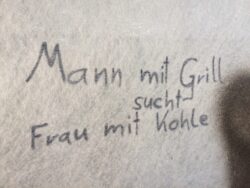
Last summer, a colleague pointed out this graffiti to me. We both snorted with laughter – and we both felt the need to photograph it and share it with as many people as possible.
Because I’ve developed a bad case of translatoritis, I compulsively began translating it – or at least trying to translate it: “Man with a grill seeking woman with coal.” Hmmm…. That would be the literal translation of the graffiti in the picture (at least for an American – I’m not sure that a “grill” in British English is the semi-portable thing that one can cook on). But it falls a little flat, doesn’t it? One might be tempted to think that someone with a strange imagination – or strange needs – is looking for their ideal partner: your Bacall to my Bogart. Your macaroni to my cheese. Your coal to my grill.
So why did my colleague and I laugh? The quip only makes sense in German, of course. And in German, it’s pretty funny – at least to women. Without exception, every woman I’ve shown this to has laughed – and laughed heartily. Of course, I mean every woman who knows German, but this regardless of her country of origin, her first language, her age.
Enough to get a translator thinking…. It’s certainly easy enough to lose humor in translation. But what to do? If the literal translation isn’t funny, how could you render this in English to make someone smile? If you tried to explain the humor to a non-German speaker, it might go something like this:
“Well, the writer, the man with a grill, says he’s looking for a woman with ‘coal’ – or ‘charcoal’ – I guess so that the grill works. It’s funny because, in German, Kohle (coal) is slang for money – like bread or dough in English. Then there are the obvious insinuations about fire and passion So, the man with a grill is looking for a woman with money, but he’s also looking for someone who is, so to speak able – and I assume willing – to light his fire.”
And the non-German speaker would say, hopefully politely, “Oh, I see.” But he or she wouldn’t laugh. What’s there to laugh about? What is light-hearted and fun in the original has become cerebral and a quasi socio-linguistic study of the various meanings, associations, and connotations of coal and grill, money and passion – we could even go on to perform an analysis of contemporary gender roles. But will this explanation provoke a laugh?
Nope.
A looser translation could be: Pleasure-seeking man looking for sugar mama. Or: Pleasure-seeking man looking for sugar mama ready to light his fire. That is, perhaps, what’s implied by the words, but much of humor is being subtle and indirect (and linguistic jokes live from slightly shifted contexts, which would be a whole other kettle of fish to write about). So, if you come across this graffiti and want to translate it for a non-German-speaking friend – and if you’re super quick at analyzing hidden meaning and finding suitable words – you might say, “Oh, this graffiti is hilarious! It says, ‘Pleasure-seeking man looking for sugar mama.’ Or, ‘Pleasure-seeking man looking for sugar mama ready to light his fire.’” You might chuckle at it, but your non-German-speaking friend is going to really wonder about you. What’s so hilarious about it? It isn’t even mildly funny. By directly translating the implication of the joke (or one of the implications), you steal the poor joke’s thunder.
In the end, any attempt to explain the humor, would probably wind up confirming the widely held belief that Germans aren’t funny. Just saying “German humor” makes a lot of people snort – as though it were the funniest German joke ever. A colleague recently sent me a BBC article on this very topic. It homes in on the fact that much of German humor is linguistic by nature, ergo it gets lost in translation. Here’s the link: http://www.bbc.com/travel/story/20170802-why-people-think-germans-arent-funny
Of course, there’s a distinct possibility that a lot of people think language jokes are the epitome of nerdiness. Laughing about words? Really? Maybe they have a point on the nerdiness… But this word-nerd loves them. And Mann mit Grill sucht Frau mit Kohle is funny. But it doesn’t translate.
(Originally posted in August 2017)